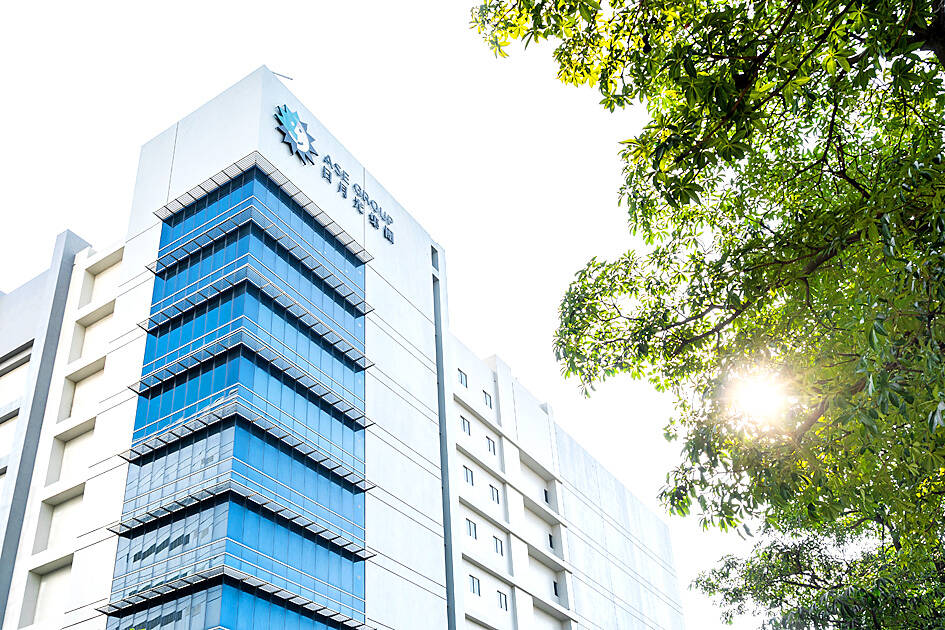ASE Technology Holding Co (日月光投控), the world’s biggest chip assembly and testing manufacturing (ATM) service provider, yesterday said revenue from its leading-edge packaging and testing services would more than double to US$1.6 billion this year, thanks to accelerating adoption of artificial intelligence (AI) technology spreading to edge devices.
That compared with US$600 million last year and US$250 million in 2023 from advanced packaging and testing services, the Kaohsiung-based company told an investors’ conference.
ASE said that non-AI applications this year have adopted advanced packaging technology similar to the chip-on-wafer-on-substrate (CoWoS) technology.

Photo: Grace Hung, Taipei Times
CoWoS is primarily used in packaging Nvidia Corp’s AI chips made by Taiwan Semiconductor Manufacturing Co (TSMC, 台積電).
This year, ASE’s ATM revenue would extend the robust growth of last year, the company said.
The global semiconductor market, excluding the memory chip market, is forecast to grow about 13 percent annually this year, International Data Corp said.
ASE said the forecast did not include the “potential upside” from increased demand from Chinese customers as a result of new semiconductor restrictions imposed by the US Bureau of Industry and Security (BIS).
“We are trying to understand the detailed execution, the rules and also the capacity requirement,” ASE chief operating officer Tien Wu (吳田玉) said.
“We do understand this is an upside and we are aggressively working with our foundry partner and customers to try to fulfill that demand,” Tien said.
Based on the BIS regulations, TSMC is banned from shipping 14-nanometer or 16-nanometer chips to China, unless the chips are packaged and tested by entities approved by the bureau.
Overall, ASE believes this year would be “decent” for the company.
“We will continue to accelerate in preparation for the AI-led supercycle, which we believe started in 2024 and we will see the momentum in 2025, 2026 and beyond,” Wu said.
To cope with growing demand, ASE plans to spend US$2 billion on new manufacturing equipment and facilities this year in Taiwan and overseas, up from US$1.9 billion last year.
Despite the increased capital expenditure, ASE would still improve its gross margin, chief financial officer Joseph Tung (董宏思) said.
The gross margin of its ATM business this year would rise to 24 to 30 percent from 22.5 percent last year, Tung said.
Further improvement is expected next year, he added.
ASE’s net profit last year increased 2 percent to NT$32.48 billion (US$990.18 million), compared with NT$31.73 billion in 2023. Earnings per share rose to NT$7.52 from NT$7.39 a year earlier.
ASE said that it expects ATM revenue this quarter to decline by a single-digit percent sequentially from NT$88.38 billion, while gross margin is to drop by 1 percentage point from 23.3 percent last quarter.
It expects high-performance computing to show the strongest growth momentum this quarter, Tung said.
The communications segment is picking up faster than other segments, while the automotive segment is in the process of recovery, he said.
On the electronic manufacturing service (EMS) side, revenue is to drop slightly year-on-year from NT$59.33 billion a year earlier, ASE said.
Operating profit margin is projected to slide 0.3 percentage points from 2.8 percent the previous year, it added.

BYPASSING CHINA TARIFFS: In the first five months of this year, Foxconn sent US$4.4bn of iPhones to the US from India, compared with US$3.7bn in the whole of last year Nearly all the iPhones exported by Foxconn Technology Group (富士康科技集團) from India went to the US between March and last month, customs data showed, far above last year’s average of 50 percent and a clear sign of Apple Inc’s efforts to bypass high US tariffs imposed on China. The numbers, being reported by Reuters for the first time, show that Apple has realigned its India exports to almost exclusively serve the US market, when previously the devices were more widely distributed to nations including the Netherlands and the Czech Republic. During March to last month, Foxconn, known as Hon Hai Precision Industry

Taiwan Semiconductor Manufacturing Co (TSMC, 台積電) and the University of Tokyo (UTokyo) yesterday announced the launch of the TSMC-UTokyo Lab to promote advanced semiconductor research, education and talent development. The lab is TSMC’s first laboratory collaboration with a university outside Taiwan, the company said in a statement. The lab would leverage “the extensive knowledge, experience, and creativity” of both institutions, the company said. It is located in the Asano Section of UTokyo’s Hongo, Tokyo, campus and would be managed by UTokyo faculty, guided by directors from UTokyo and TSMC, the company said. TSMC began working with UTokyo in 2019, resulting in 21 research projects,

Ashton Hall’s morning routine involves dunking his head in iced Saratoga Spring Water. For the company that sells the bottled water — Hall’s brand of choice for drinking, brushing his teeth and submerging himself — that is fantastic news. “We’re so thankful to this incredible fitness influencer called Ashton Hall,” Saratoga owner Primo Brands Corp’s CEO Robbert Rietbroek said on an earnings call after Hall’s morning routine video went viral. “He really helped put our brand on the map.” Primo Brands, which was not affiliated with Hall when he made his video, is among the increasing number of companies benefiting from influencer

Quanta Computer Inc (廣達) chairman Barry Lam (林百里) yesterday expressed a downbeat view about the prospects of humanoid robots, given high manufacturing costs and a lack of target customers. Despite rising demand and high expectations for humanoid robots, high research-and-development costs and uncertain profitability remain major concerns, Lam told reporters following the company’s annual shareholders’ meeting in Taoyuan. “Since it seems a bit unworthy to use such high-cost robots to do household chores, I believe robots designed for specific purposes would be more valuable and present a better business opportunity,” Lam said Instead of investing in humanoid robots, Quanta has opted to invest